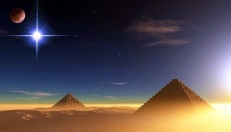I started writing my most current manuscript, Daughter of Lilith, as another fantasy novel. However, since the main character of the story is part demon, and there’s a love interest I soon found myself writing a paranormal romance. Gotta admit, it shocked me when my beta readers came back saying this isn’t fantasy. I wanted to fight it, not that I have anything against paranormal romance, or any other genre. Just never thought of myself as a romance writer of any sort.
While the romance sub-plot is important in advancing the story, it’s still a sub-plot. I didn’t want to be a paranormal romance book like Twilight and the rest…
‘Wait,’ you say. ‘Isn’t Twilight urban fantasy?’
The genre of speculative fiction is about as clean cut as insurance claim forms and the Federal budget. What’s the difference between fantasy and paranormal? Can there be paranormal without romance? If Bilbo Baggins moved out of the Shire and moved to Rivendell to chat it up with Elrond more often would such a story become urban fantasy since Rivendell is an urban setting? Where are the lines drawn, and can it effect writers who are querying and labeling their works one way instead of an another?
Sadly, yes. Some agents or publishers will see a genre and dismiss it. Unfair? For the writer, sure. But in their defense, agents may receive hundreds of query requests a week, maybe even a day (honestly). They need to have some filter in place, and if they select to filter by genre and are looking for urban fantasy and not paranormal romance, a query can be moved to the trash without a second or even a first look.
But many books and movies have more than one speculative fiction component. I’ll take Star Wars again as an example. You have space ships, lasers, and alien races. Clearly this is a science-fiction movie, right? Well, you have sword fights. Sure the blades are made of light, but there’s no denying the techniques and battles are grounded in fencing and swordplay, a Medieval component and main form of combat back then. You also have The Force. A power that allows seemingly ordinary people to manipulate the world around them without any scientific explanation. That’s practically a dictionary definition of magic. Of course this is before the introduction of the midi-chlorides (don’t get me started on that). But for those of us who have grown up with just the first three movies…or rather the fourth through sixth movies, the Force had no explanation other than “an energy field created by all living things. It surrounds us, penetrates us, and binds the galaxy together.” On Earth this is known as duct tape. So if it’s a field created by all living things, where do these midi-chlorides come in? Okay, I’m going off on a tangent here, I know.
The point is many books, movies, and TV shows have both magical and sci-fi elements. If a mage uses a laser gun, or an astronaut lands on an alien planet where shaman can make it rain by casting a spell, how do we categorize these works?
There’s usually a clear line drawn between what is considered science fiction and what’s fantasy. It’s only worse between similar genres such as fantasy, high fantasy, magical realism, paranormal romance, mythic fiction, urban fantasy, low fantasy, epic fantasy, dark fantasy…you get the idea.
The truth is most of these sub-genres overlap, and personally, I believe nit picking over what label to attach to one’s work should not be a prime concern for the writer, agent, publisher or reader.
If you want to say the story is paranormal because the main character is a ghost, fine. If that ghost is also a wizard, call it fantasy, who cares? And if that wizard created a time machine using midi-chlorides, make it sci-fi, no problem. But if the inventor is Merlin, I guess we’re looking at Mythic Fantasy, right? And if that time machine needs to be delivered to Arthur before Morgana unleashes a horrible spell that will destroy the entire planet, throwing it into eternal chaos for one thousand years, and Merlin must trek four hundred miles and battle her forces to get to Arthur we have ourselves a good old fashion Epic Fantasy tale…unless it takes place in modern times and Merlin fails, in which case it would be dystopian.
The aspirin’s on the bottom shelf, I’ll get you some water.


My favourite bit of fantasy is seeing how many different things you can smash together to create the worlds. Case in point, the dystopian epic mythic time travel fantasy sounds Epic.